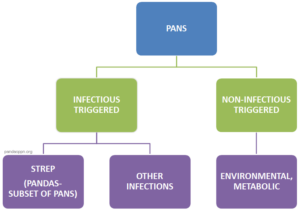PANS/PANDAS resources for the American Academy of Pediatrics – AAP
PANS/PANDAS FAST FACTS
FOR PEDIATRICIANS
Consider PANS/PANDAS when you see a patient with a sudden and dramatic onset of unwanted thoughts, fears, rituals, obsessive compulsive disorder, and/or an overall abrupt decline in mental health.
Strep or other infections, such as Mycoplasma pneumonia, influenza, upper respiratory infections, or sinusitis, may be triggering the neurobehavioral changes and psychological distress.
PANS/PANDAS is treatable. Treatment is a three pronged approach that addresses the source (infections), the immune system dysfunction, and the symptoms.
PANS/PANDAS: SYMPTOMS & DIAGNOSING
Children with PANS have an abrupt and dramatic onset of OCD or Restrictive Eating Disorder plus additional symptoms from at least 2 of the following categories:
- Anxiety and/or separation anxiety
- Emotional lability and/or depression
- Irritability, aggression, and/or severe oppositional behaviors
- Behavioral regression
- Deterioration in school performance
- Sensory or motor abnormalities (including tics)
- Somatic signs and symptoms, including sleep disturbances or urinary frequency
PANS (Pediatric Acute-onset Neuropsychiatric Syndrome) is a clinically defined disorder. Patients experience a sudden onset of obsessive-compulsive symptoms (OCD) and/or eating restrictions, along with acute deterioration in at least two of the symptom categories listed above. The syndrome is thought to be an immune reaction to a number of physiological stressors including Group A Streptococcal infection, Mycoplasma pneumonia infection, influenza, upper respiratory infections, sinusitis, Lyme, and psychosocial stresses. PANS has no age limitation.
PANDAS (Pediatric Autoimmune Neuropsychiatric Disorders Associated with Streptococcal infections) is a subset of PANS. PANDAS has five distinct criteria for diagnosis, including abrupt OCD or dramatic, disabling tics; a relapsing-remitting, episodic symptom course; young age at onset (average of 6–7 years); presence of neurologic abnormalities; and temporal association between symptom onset and Group A strep infection. The 5 criteria usually are accompanied by similar comorbid symptoms as found in PANS.
TRADITIONAL OCD VS PANS/PANDAS
PANS/PANDAS differs from traditional childhood OCD in presentation and treatment options. PANDAS/PANS may be considered a form of Basal Ganglia Autoimmune Encephalitis.
WHAT ARE THE BEST RESOURCES TO HELP ME WITH MY PATIENT?
PANS/PANDAS Treatment Charts
The PANS/PANDAS treatment charts guide you through treatment considerations based on the symptom severity for mild, moderate, and severe cases.
Seeing Your First Child with PANDAS/PANS
“Seeing Your First Child with PANDAS/PANS”, by Margo Thienemann, MD, co-director of Stanford’s Immune Behavioral Health Clinic and the PPN Diagnostics and Therapeutics Committee, provides an overview and current theories, PANDAS/PANS symptoms and diagnostic criteria, workup recommendations, and expectations.
PANS Research Consortium Consensus Statement and Treatment Recommendations
“In cohorts of well-characterized PANS patients, evidence of postinfectious autoimmunity and/or neuroinflammation is found in more than 80% of cases (Swedo, et al.).” The JCAP papers include details on PANS/PANDAS treatment options including antibiotics to remove the source of inflammation (strep or other infection), anti-inflammatories, IVIG, behavioral therapies, and more.
PANS/PANDAS Clinics
Pediatricians can diagnose PANS/PANDAS and implement the majority of treatments. There are a limited number of multidisciplinary care clinics available for more complex cases. Please note some clinics have strict criteria for seeing new patients due to high demand.






